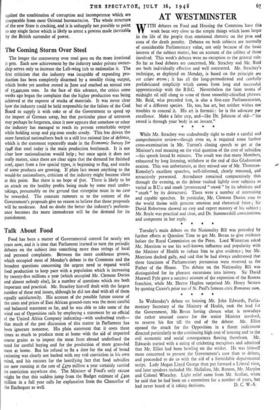AT WESTMINSTER
WITH debates on Food and Housing the Commons have this week been very close to the simple things which loom larger in the life of the people than emotional rhetoric on the pros and cons of the death penalty. Debates on both subjects are normally of considerable Parliamentary value, not only because of the basic interest of the subject matter, but on account of the calibre of those involved. This week's debates were no exception to the general rule. So far as food debates are concerned, Mr. Strachey and Mr. Reid are both individually effective and well contrasted. Mr. Strachey's technique, as deployed on Monday, is based on the principle ars est celare artem ; it has all the long-premeditated and carefully prefabricated simplicity which comes from long and successful apprenticeship with the B.B.C. Nevertheless the faint aroma of midnight oil still clung to some of those smoothly-chiselled phrases. Mr. Reid, who preceded him, is also a first-rate Parliamentarian, but of a different species. He, too, has art, but neither wishes nor troubles to conceal it. His art is forensic: he is the advocate par excellence. Make a false step, and—like Dr. Johnson of old—" his sword is through your body in an instant."
While Mr. Strachey was undoubtedly right to make a careful and comprehensive review—though even so, it required some further cross-examination in Mr. Turton's closing speech to get at the Minister's real meaning on the vital question of the cost of subsidies —his speech lasted 81 minutes. The result was that many Members, exhausted by long listening, withdrew at the end of this Gladstonian oration. This was unfortunate, as they missed one of Mr. Thornton- Kemsley's excellent speeches, well-informed, clearly reasoned, and attractively presented. Attendance remained comparatively thin through the evening, as the debate vaulted lightly over subjects as varied as B.U.s and snoek (pronounced " snook " by its admirers and " snurk " by its detractors). There were a number of interesting and capable speeches. In particular, Mr. Clement Davies rose to the world theme with genuine emotion and rhetorical force ; Sir David Robertson showed an easy and expert mastery of his subject ; Mr. Royle was practical and clear, and Dr. Summerskill conscientious and competent in her reply.
Tuesday's main debate on the Nationality Bill was preceded by further efforts at Question Time to get Mr. Bevan to give evidence before the Royal Commission on the Press. Lord Winterzon asked Mr. Morrison to use his well-known influence and popularity with the Minister of Health to induce him to give evidence ; but Mr. Morrison ducked gaily, and said that he had always understood that these functions of Parliamentary persuasion were reserved to the Father of the House. The debate on the Nationality Bill was distinguished for its pleasant excursions into history. Sir David Maxwell Fyfe gave a succinct account of the expansion of the Roman franchise, while Mr. Hector Hughes surprised Mr. Henry Strauss by quoting Cicero's prior use of St. Paul's famous civis Romanus sum.
In Wednesday's debate on housing Mr. John Edwards, Parlia- mentary Secretary of the Ministry of Health, took the lead for the Government, Mr. Bevan having chosen what is nowadays the rather unusual course for the senior Minister involved, to reserve his fire till the end of the debate. Mr. Elliot opened the attack for the Opposition in a fluent indictment directed particularly to the continuing high cost of housing and to the evil economic and social consequences flowing therefrom Mr. Edwards started with a string of cricketing metaphors and admitted that Mr. Elliot had been bowling on the wicket. He was himself more concerned to present the Government's case than to debate, and proceeded to do so with the aid of a formidable departmental script. Lady Megan Lloyd George then put forward a Liberal view, and later speakers included Mr. Mallalieu, Mr. Renton, Mr. Marples and Colonel Wheatley. Light relief came from Mr. Scollan, when he said that he had been on a committee for a number of years, but had never heard of it taking decisions. D. C. W.-S.


































 Previous page
Previous page